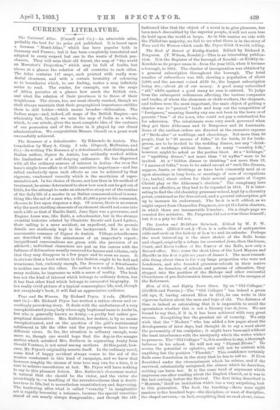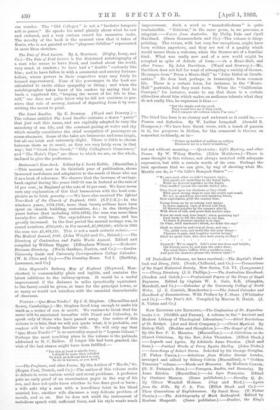Eton of OU, and Eighty Years Since. By an "Old
Colleger." (Griffith and Farran.)—The "Old Colleger" has indeed a green old age, if, having entered Eton in 1811, he can write in this vigorous fashion about the men and boys of old. The distance of time is indeed so astonishing that it is impossible to avoid the speculation whether this is not a literary tour de force. We are bound to say that, if it is, it has been achieved with very great success. Everything bas the greatest air of veracity, We only wish that the " Modern " who has added a few pages about the developments of later days, had thought fit to say a word about the personality of his coadjutor; it might have been said without the least interference with the anonymity which the writer wishes to preserve. The" Old Colleger" is, it is needless to say, a thorough believer in his school. He will not say " Floreet Etona." He scorns the potential or optative, and will not be content with anything but the positive "Florebit." This confidence certainly finds some foundation in the story that he has to tell us. If Eton flourished under the circumstances which he relates, and if she survived, substantially uninjured, the abuses which he describes, nothing can harm her. It is the same kind of argument which impresses one after reading about the English Church, as it was in the last century, before the Revival. The first thing described is " Montem," itself an institution which has a very surprising look to this generation. The food, the teaching—there were eight masters to five hundred boys—the discipline, or want of discipline, the chapel eervices,—in fact, everything that we read about, raises
our wonder. The "Old Colleger " is not a " laudator temporis acti se puero." He speaks his mind, plainly about what he saw and endured, and a very curious record his memories make. The novelty of the book is the unusual view that it takes of Keats, who is not painted. as the "plagosus Orbilius" represented in most Eton sketches.



































 Previous page
Previous page